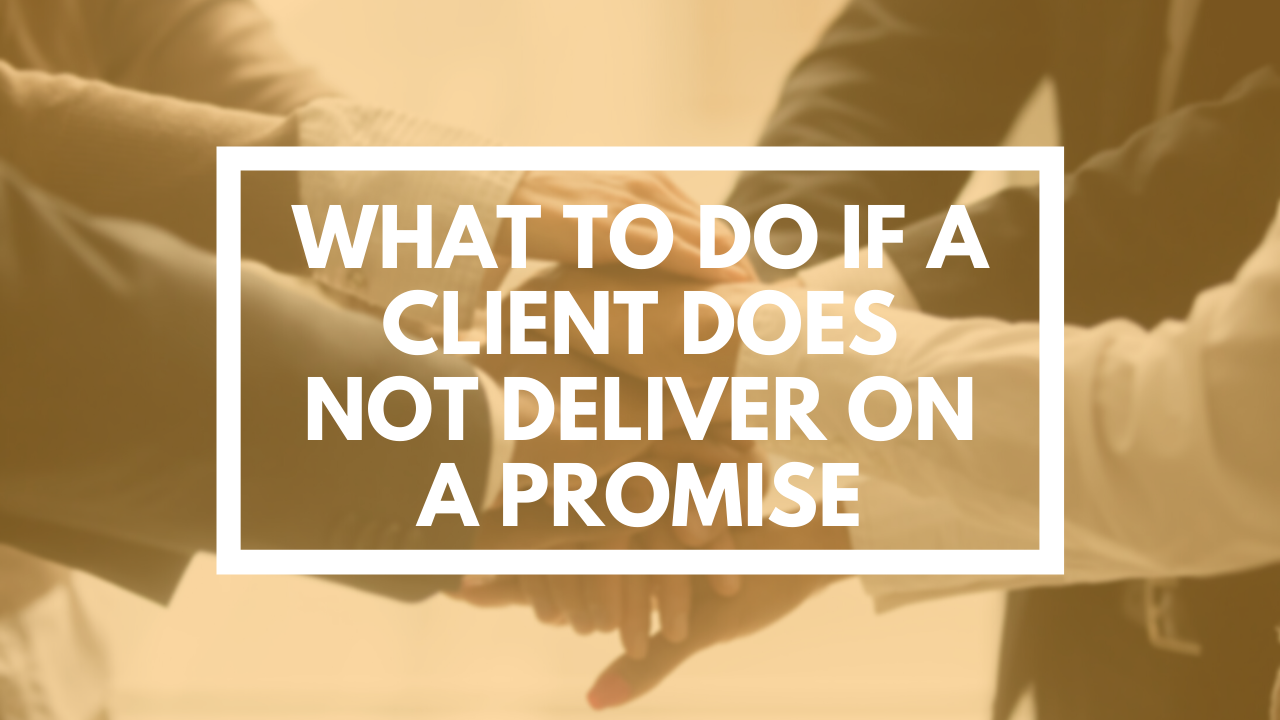
What To Do When a Client Doesn't Deliver on a Promise
Feb 04, 2020I’m sure this will have happened to you at some point: a client agrees to do something, give you information in a certain format by a certain time, and they just don’t deliver.
You then have to work longer and harder to fix the problem, so should you charge the client for it?
Here are 7 things you ought to consider before you do…
1 - How Clear Were You?
At the outset, how clear were you in your price agreement about the criteria the client had to meet? Is it crystal clear what the client has promised to do? Is it in writing?
If you weren’t clear enough, or you don’t have the conditions in writing, it becomes much more difficult to put the price up. You will get pushback, or you may even lose the client.
Make sure you are always very clear on what the client needs to do, the scope of the work and who is responsible - and get it in writing.
2 - Consequences
Were you also clear on what the consequences would be if the conditions were not met?
If, for example, you had agreed in your price engagement that the price was dependent on the client giving you a fully reconciled bank account, was it made clear what the price would be if they failed to deliver on this?
If you are really clear on this from the outset, it will be much easier to charge a higher price because the client was given advanced warning.
Uncertainty will give the client an excuse to push back on the price change, but if you are crystal clear, they will not be able to complain.
3 - Get It Signed
Do you have an agreement down in writing that has been signed by the client?
You and your client should both have a copy of a signed engagement letter and a signed fixed-price agreement.
This is evidence of the client's understanding and agreeing to their responsibilities, so make sure it is part of your process.
4 - Should You Increase Your Price?
Yes, absolutely!
If you have done the above 3 steps and made sure there was complete clarity over the client’s responsibilities and the consequential price rise, there is no reason for you to not put up your price.
The client was made aware that this would happen if they failed to deliver on their promise so they will expect the price rise.
However…
5 - Can You Give Advanced Notice?
The more distant in the future the payment seems, the less pain the client will feel.
If you asked the client to pay you $500 by tomorrow, they feel the pain of that payment. But if you tell them they have 30 days to make the payment, that puts the payment further into the future and they don’t feel the pain as much.
6 - Give the Client A Choice
You may offer the client a choice like this…
“When we gave you a price for the engagement, you said you would do this. We notice that you haven’t, therefore we need to raise the price as stated in the agreement.
However, if you want, we can send the information back and you can correct it yourself. This way we can stick with the existing price.
Alternatively, we will need to do this additional work ourselves. We are very happy to do this for you, but there will be an additional price.”
This gives the client the choice to do what they said they would, or simply pay you more.
7 - Always Get The Brownie Points
If you still feel uncomfortable charging your clients, if you are concerned about ‘nickel and diming’ them, or the issue is minor, you may decide to let them off the hook.
But you should at least get the brownie points from your client by telling them…
“When we did the agreement, you said you would do this but you haven’t. We would normally need to charge you an extra $100, however this time we will do that extra work for free. But, if it happens again in the future, there will be an additional charge.”
The client is now aware of the issue, you have quantified the value of the work you will do for free, and the phrase ‘this time’ shows the client that this will not happen again.
These are some of the things you ought to consider before you charge your clients extra fees.
If you found this valuable and would like to learn more about value pricing, I run a free live online training session every month with a topic chosen by you. Attend live and you can ask me any questions you have. Click here to register and I will send you an invitation to the next session.
Wishing you every success on your pricing journey
Mark Wickersham
Chartered Accountant, Public Speaker and Author of Amazon No.1 Best Seller “Effective Pricing for Accountants”

